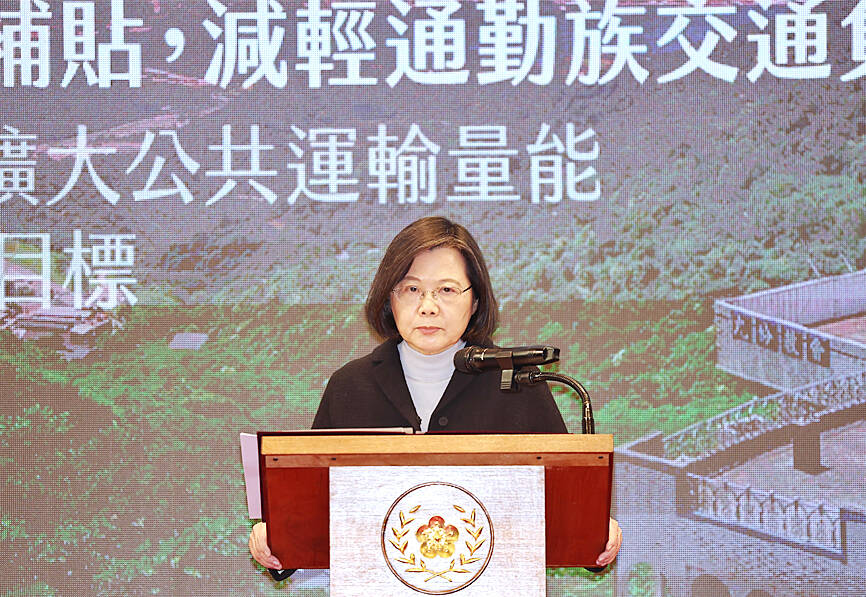President Tsai Ing-wen (蔡英文) in her New Year’s address yesterday urged Beijing to resume talks with Taipei to help maintain stability in the region.
“War is never an option for solving a problem,” Tsai said. “Only by boosting stable development in the region together through dialogue and collaboration can we bring security and happiness to more people.”
“It is the common responsibilities of the two sides across the Taiwan Strait to maintain stability in the region,” she said, adding she is looking forward to the resumption of regular exchanges between the two sides of the Taiwan Strait when the COVID-19 pandemic subsides

Photo: CNA
Chinese President Xi Jinping (習近平) made only a brief reference to Taiwan in his New Year’s address on Saturday evening, saying that people on both sides of the Strait “are members of one and the same family.”
Some local media have speculated that Xi was using a softer tone concerning cross-strait relations as he did not specifically call for cross-strait unification in his Saturday address, although he did imply it.
Tsai, in response to media questions about Xi’s address, said Xi was using a more “gentle tone” in reference to cross-strait relations.
“But I want to remind people — the military activities of the People’s Liberation Army near Taiwan are not at all conducive to cross-strait relations nor regional peace and stability,” she said.
The Ministry of National Defense said that 24 Chinese People’s Liberation Army aircraft and four navy vessels were seen near Taiwan from 6am on Saturday to 6am yesterday, with 15 of the aircraft crossing the median line of the Taiwan Strait — a slightly higher number than the average daily figure.
Beijing has been aggressively ramping up pressure on Taiwan with military exercises over the past few months since US House of Representatives Speaker Nancy Pelosi visited Taipei in August, leading to growing concern among stakeholders in the region, including Washington.
In her New Year’s address, Tsai also said that Taiwan is willing to provide China with “necessary assistance” to help it deal with a surge in COVID-19 cases, so that more Chinese people can enjoy a healthy and safe year.
In an abrupt change of policy, China last month began dismantling the world’s strictest COVID-19 regime of lockdowns and extensive testing, meaning the disease is spreading largely unchecked and likely infecting millions of people per day, some international health experts say.
“As long as there is a need, based on the position of humanitarian care, we are willing to provide the necessary assistance to help more people emerge from the pandemic and have a healthy and safe new year,” Tsai said, without elaborating.
Tsai did not say if China had made such a request.

CHAOS: Iranians took to the streets playing celebratory music after reports of Khamenei’s death on Saturday, while mourners also gathered in Tehran yesterday Iranian Supreme Leader Ayatollah Ali Khamenei was killed in a major attack on Iran launched by Israel and the US, throwing the future of the Islamic republic into doubt and raising the risk of regional instability. Iranian state television and the state-run IRNA news agency announced the 86-year-old’s death early yesterday. US President Donald Trump said it gave Iranians their “greatest chance” to “take back” their country. The announcements came after a joint US and Israeli aerial bombardment that targeted Iranian military and governmental sites. Trump said the “heavy and pinpoint bombing” would continue through the week or as long

TRUST: The KMT said it respected the US’ timing and considerations, and hoped it would continue to honor its commitments to helping Taiwan bolster its defenses and deterrence US President Donald Trump is delaying a multibillion-dollar arms sale to Taiwan to ensure his visit to Beijing is successful, a New York Times report said. The weapons sales package has stalled in the US Department of State, the report said, citing US officials it did not identify. The White House has told agencies not to push forward ahead of Trump’s meeting with Chinese President Xi Jinping (習近平), it said. The two last month held a phone call to discuss trade and geopolitical flashpoints ahead of the summit. Xi raised the Taiwan issue and urged the US to handle arms sales to

State-run CPC Corp, Taiwan (CPC, 台灣中油) yesterday said that it had confirmed on Saturday night with its liquefied natural gas (LNG) and crude oil suppliers that shipments are proceeding as scheduled and that domestic supplies remain unaffected. The CPC yesterday announced the gasoline and diesel prices will rise by NT$0.2 and NT$0.4 per liter, respectively, starting Monday, citing Middle East tensions and blizzards in the eastern United States. CPC also iterated it has been reducing the proportion of crude oil imports from the Middle East and diversifying its supply sources in the past few years in response to geopolitical risks, expanding

Pro-democracy media tycoon Jimmy Lai’s (黎智英) fraud conviction and prison sentence were yesterday overturned by a Hong Kong court, in a surprise legal decision that comes soon after Lai was jailed for 20 years on a separate national security charge. Judges Jeremy Poon (潘兆初), Anthea Pang (彭寶琴) and Derek Pang (彭偉昌) said in the judgement that they allowed the appeal from Lai, and another defendant in the case, to proceed, as a lower court judge had “erred.” “The Court of Appeal gave them leave to appeal against their conviction, allowed their appeals, quashed the convictions and set aside the sentences,” the judges